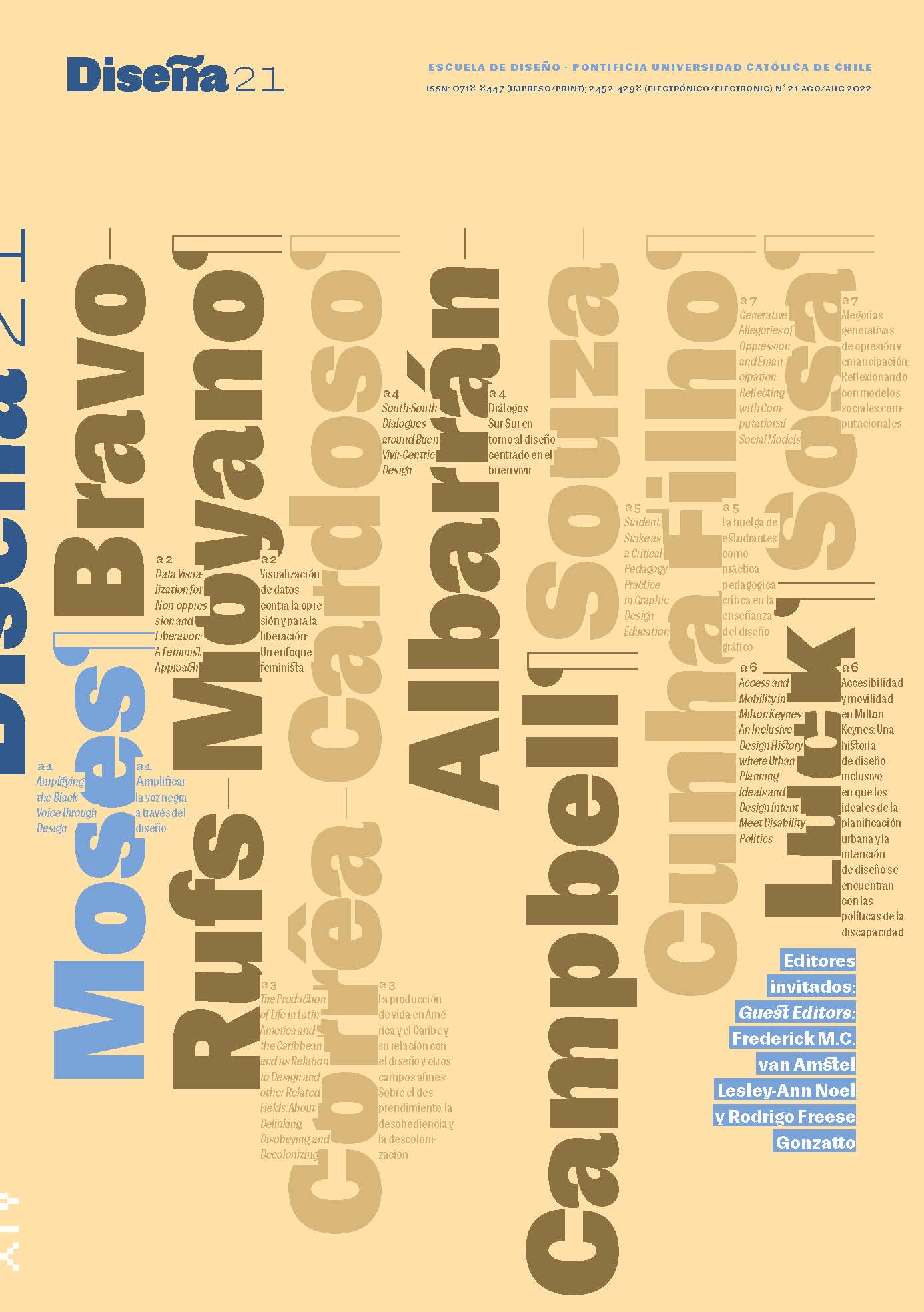Student Strike as a Critical Pedagogy Practice in Graphic Design Education
Main Article Content
Abstract
This article reports on and analyzes the experience of undergraduate Industrial Arts Graphic Design students autonomously planning and holding an event (préocupe) using action research methods to address two issues: fragmentation of the student body and the feeling of inadequacy. By framing Vieira Pinto’s concepts of 'work' and 'critical consciousness', this research confirmed that students’ existential reality is akin to that of the working classes: they both work for others when performing their regular activities. The paper presents the statements of students gathered in a collective interview to demonstrate that préocupe instantiated the pedagogical essence of striking: developing the class’s critical consciousness. This work pertains to other initiatives challenging the spread of neoliberal education worldwide, and is a meaningful contribution to critical pedagogy practices in design education, with accounts of students developing both operational graphic design skills and critical consciousness autonomously.
Downloads
Article Details

This work is licensed under a Creative Commons Attribution-ShareAlike 4.0 International License.

This work is licensed under a Creative Commons Attribution-ShareAlike 4.0 International license.
COPYRIGHT NOTICE
All contents of this electronic edition are distributed under the Creative Commons license of "Attribution-ShareAlike 4.0 Internacional" (CC-BY-SA). Any total or partial reproduction of the material must mention its origin.
The rights of the published images belong to their authors, who grant to Diseña the license for its use. The management of the permits and the authorization of the publication of the images (or of any material) that contains copyright and its consequent rights of reproduction in this publication is the sole responsibility of the authors of the articles.
References
Abdulla, D. (2019). Radicalise Me. In F. Laranjo (Ed.), Modes of Criticism 4: Radical Pedagogy (pp. 4–11). Onomatopee.
Amorim Junior, J. W. de, Schlindwein, V. de L. D. C., & Matos, L. A. L. de. (2018). O trabalho do professor EBTT: Entre a exigência do capital e a possibilidade humana. Revista on line de Política e Gestão Educacional, 22(3), 1217–1232. https://doi.org/10.22633/rpge.v22i3.11894
Angelon, R., & van Amstel, F. (2021). Monster Aesthetics as an Expression of Decolonizing the Design Body. Art, Design & Communication in Higher Education, 20(1), 83–102. https://doi.org/10.1386/adch_00031_1
Cipriani, C. (2018). Princípios do conceito de consciência em Vieira Pinto: Possíveis diálogos com a obra teórico-pedagógica de Paulo Freire. Anais Das Reuniões Regionais Da ANPEd. Presented at the XII ANPEd-SUL: Educação, Democracia e Justiça Social, Rio de Janeiro. http://anais.anped.org.br/regionais/sites/default/files/trabalhos/2/2535-TEXTO_PROPOSTA_COMPLETO.pdf
Elzenbaumer, B. (2013). Designing Economic Cultures: Cultivating Socially and Politically Engaged Design Practices Against Procedures of Precarisation [Doctoral Dissertation, Goldsmiths, University of London]. https://research.gold.ac.uk/id/eprint/9920/
Freire, P. (2001). Pedagogy of Freedom: Ethics, Democracy, and Civic Courage. Rowman & Littlefield.
Freire, P. (2020). Educação como prática da liberdade (48th Ed.). Paz e Terra.
Gielen, P., & Bruyne, P. D. (Eds.). (2012). Teaching Art in the Neoliberal Realm: Realism versus Cynicism. Valiz.
Gonzatto, R. F. (2018). Usuários e produção da existência: Contribuições de Álvaro Vieira Pinto e Paulo Freire à interação humano-computador [Doctoral Dissertation, Universidade Tecnológica Federal do Paraná]. http://repositorio.utfpr.edu.br:8080/jspui/handle/1/3794
Gonzatto, R. F. (2022). Consciência ingênua e crítica em Vieira Pinto e Paulo Freire [Slides] https://www.slideshare.net/gonzatto/conscincia-ingnua-e-crtica-em-vieira-pinto-e-paulo-freire-atualizado
hooks, bell. (2020). Ensinando pensamento crítico: Sabedoria prática (B. Libanio, Trans.). Elefante.
Kemmis, S., McTaggart, R., & Nixon, R. (2014). The Action Research Planner. Springer.
Laranjo, F. (2017). Design as Criticism: Methods for a Critical Graphic Design Practice [Doctoral Dissertation, University of the Arts London]. https://ualresearchonline.arts.ac.uk/id/eprint/12027/
Laranjo, F. (Ed.). (2019). Modes of Criticism 4: Radical Pedagogy. Onomatopee.
Laval, C. (2019). A escola não é uma empresa (2nd Ed.). Boitempo. https://www.boitempoeditorial.com.br/produto/detalhe/890/a-escola-nao-e-uma-empresa
Lei No 11.892. Institui a Rede Federal de Educação Profissional, Científica e Tecnológica, cria os Institutos Federais de Educação, Ciência e Tecnologia, e dá outras providências. (2008). http://www.planalto.gov.br/ccivil_03/_ato2007-2010/2008/lei/l11892.htm
Lindgren, J. (Ed.). (2018). Extra-curricular: On and Around the Topic of Self-organized Learning, Curriculum, Experiments, and Alternatives in Graphic Design Education. Onomatopee.
Lorusso, S. (2019). Entreprecariat: Everyone is an Entrepreneur, Nobody is Safe. Onomatopee.
Spademan, T. B. (1999). Radical Pedagogy and the Logic of Assessment. The Radical Teacher, 56, 26–29.
Vieira Pinto, Á. (1960). Consciência e realidade nacional: A consciência crítica. Ministerio da Educação e Cultura, Instituto Superior de Estudos Brasileiros.
Vieira Pinto, Á. (1962). Por que os ricos não fazem greve? Civilização Brasileira.
Wallace, C. (2008). Critical Pedagogy. In G. McCulloch & D. Crook (Eds.), The Routledge International Encyclopedia of Education. Routledge. https://doi.org/10.4324/9781315830674
Wood, L. (2020). Introduction. In L. Wood & B. Haylock (Eds.), One and Many Mirrors: Perspectives on Graphic Design Education (pp. 6–12). The Physics Room.
Wood, L., & Haylock, B. (Eds.). (2020). One and Many Mirrors: Perspectives on Graphic Design Education. The Physics Room and Occasional Papers.
Woodcock, J., & Graham, M. (2020). The Gig Economy: A Critical Introduction. Polity.

